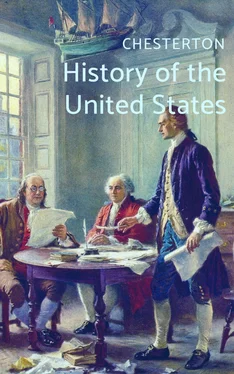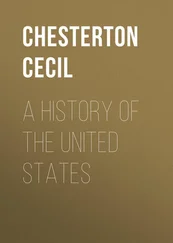1 ...6 7 8 10 11 12 ...16 The second Continental Congress, after many hesitations, determined at length upon a complete severance with the mother country. A resolution to that effect was carried on the motion of Lee, the great Virginian gentleman, an ancestor of the noblest of Southern warriors. After much adroit negotiations a unanimous vote was secured for it. A committee was appointed to draft a formal announcement and defence of the step which had been taken. Jefferson was chosen a member of the committee, and to him was most wisely entrusted the drafting of the famous "Declaration."
The introductory paragraphs of the Declaration of Independence contain the whole substance of the faith upon which the new Commonwealth was to be built. Without a full comprehension of their contents the subsequent history of America would be unintelligible. It will therefore be well to quote them here verbatim, and I do so the more readily because, apart from their historic importance, it is a pity that more Englishmen are not acquainted with this masterpiece of English prose.
When in the course of human events it becomes necessary for one people to dissolve the political bands which have connected them with another and to assume among the powers of the earth the separate and equal station to which the laws of Nature and of Nature's God entitle them, a decent respect for the opinion of Mankind requires that they shall declare the cause that impels the separation.
We hold these truths to be self-evident: that all men are created equal; that they are endowed by their Creator with certain inalienable rights; that among these are life, liberty, and the pursuit of happiness; that to secure these rights governments are instituted among men, deriving their just powers from the consent of the governed; that whenever any form of government becomes destructive of those ends it is the right of the people to alter or to abolish it, and to reinstate a new government, laying its foundation on such principles and organizing its powers in such form as to them shall seem most likely to effect their safety and happiness.
The Declaration goes on to specify the causes of grievances which the colonists conceive themselves to have against the royal government, and concludes as follows:—
We, therefore, the representatives of the United States of America in General Congress assembled, appealing to the Supreme Judge of the World for the rectitude of our intentions, do in the name and by the authority of the good people of these colonies, solemnly publish and declare that these United Colonies are and of right ought to be Free and Independent States.
The first principles set out in the Declaration must be rightly grasped if American history is understood, for indeed the story of America is merely the story of the working out of those principles. Briefly the theses are two: first, that men are of right equal, and secondly, that the moral basis of the relations between governors and governed is contractual. Both doctrines have in this age had to stand the fire of criticisms almost too puerile to be noticed. It is gravely pointed out that men are of different heights and weights, that they vary in muscular power and mental cultivation—as if either Rousseau or Jefferson was likely to have failed to notice this occult fact! Similarly the doctrine of the contractual basis of society is met by a demand for the production of a signed, sealed, and delivered contract, or at least for evidence that such a contract was ever made. But Rousseau says—with a good sense and modesty which dealers in "prehistoric" history would do well to copy—that he does not know how government in fact arose. Nor does anyone else. What he maintains is that the moral sanction of government is contractual, or, as Jefferson puts it, that government "derives its just powers from the consent of the governed."
The doctrine of human equality is in a sense mystical. It is not apparent to the senses, nor can it be logically demonstrated as an inference from anything of which the senses can take cognizance. It can only be stated accurately, and left to make its appeal to men's minds. It may be stated theologically by saying, as the Christian theology says, that all men are equal before God. Or it may be stated in the form which Jefferson uses—that all men are equal in their "inalienable rights." But it must be accepted as a first principle or not at all. The nearest approach to a method of proving it is to take the alternative proposition and deduce its logical conclusion. Would those who would maintain that the "wisest and best" have rights superior to those of their neighbours, welcome a law which would enable any person demonstrably wiser or more virtuous than themselves to put them to death? I think that most of them have enough modesty (and humour) to shrink, as Huxley did, from such a proposition. But the alternative is the acceptance of Jefferson's doctrine that the fundamental rights of men are independent of adventitious differences, whether material or moral, and depend simply upon their manhood.
The other proposition, the contractual basis of human society and its logical consequences, the supremacy of the general will, can be argued in the same fashion. It is best defended by asking, like the Jesuit Suarez, the simple question: "If sovereignty is not in the People, where is it?" It is useless to answer that it is in the "wisest and best." Who are the wisest and best? For practical purposes the phrases must mean either those whom their neighbours think wisest and best—in which case the ultimate test of democracy is conceded—or those who think themselves wisest and best: which latter is what in the mouths of such advocates it usually does mean. Thus those to whom the Divine Right of the conceited makes no appeal are forced back on the Jeffersonian formula. Let it be noted that that formula does not mean that the people are always right or that a people cannot collectively do deliberate injustice or commit sins—indeed, inferentially it implies that possibility—but it means that there is on earth no temporal authority superior to the general will of a community.
It is, however, no part of the function of this book to argue upon the propositions contained in the Declaration of Independence. It is merely necessary to chronicle the historical fact that Jefferson, as mouthpiece of the Continental Congress, put forward these propositions as self-evident, and that all America, looking at them, accepted them as such. On that acceptance, the intensity and ardent conviction of which showed itself, as will presently be seen, in a hundred ways, the American Commonwealth is built. In the modern haze of doubt and amid the denial of all necessary things, there have been found plenty of sophists, even in America, to dispute these great truisms. But if the American nation as a whole ever ceases to believe in them, it will not merely decay, as all nations decay when they lose touch with eternal truths; it will drop suddenly dead.
We must now turn back a little in time in order to make clear the military situation as it stood when Jefferson's "Declaration" turned the war into a war of doctrines.
The summer of 1775 saw the first engagement which could well be dignified with the name of a battle. A small English force had been sent to Boston with the object of coercing the recalcitrant colony of Massachusetts. It was absolutely insufficient, as the event showed, even for that purpose, and before it had landed it was apparent that its real task would be nothing less than the conquest of America. The Massachusetts rebels wisely determined to avoid a combat with the guns of the British fleet; they abandoned the city and entrenched themselves in a strong position in the neighbourhood known as Bunker's Hill. The British troops marched out of Boston to dislodge them. This they eventually succeeded in doing; and those who regard war as a game like billiards to be settled by scoring points may claim Bunker's Hill as a British victory. But it produced all the consequences of a defeat. The rebel army was not destroyed; it was even less weakened than the force opposed to it. It retired in good order to a position somewhat further back, and the British force had no option but to return to Boston with its essential work undone. For some time England continued to hold Boston, but the State of Massachusetts remained in American hands. At last, in the absence of any hope of any effective action, the small English garrison withdrew, leaving the original prize of war to the rebels.
Читать дальше












